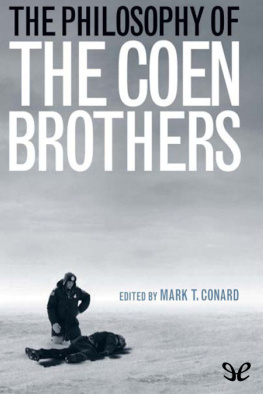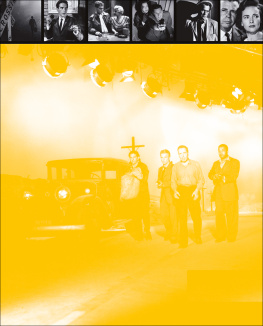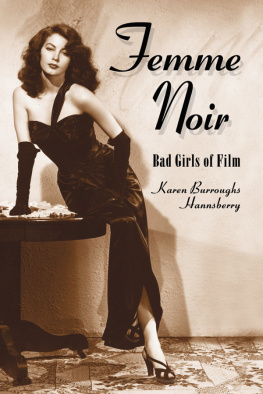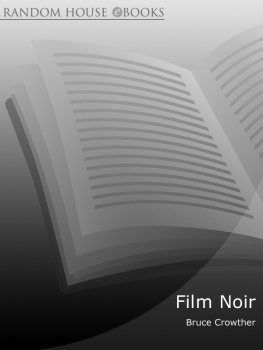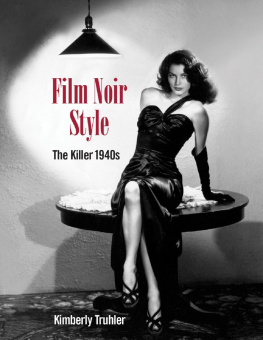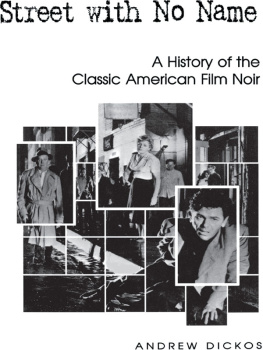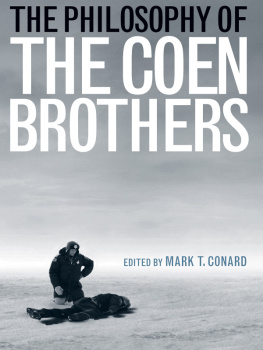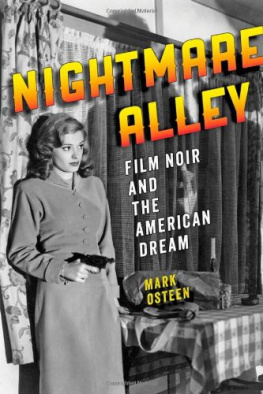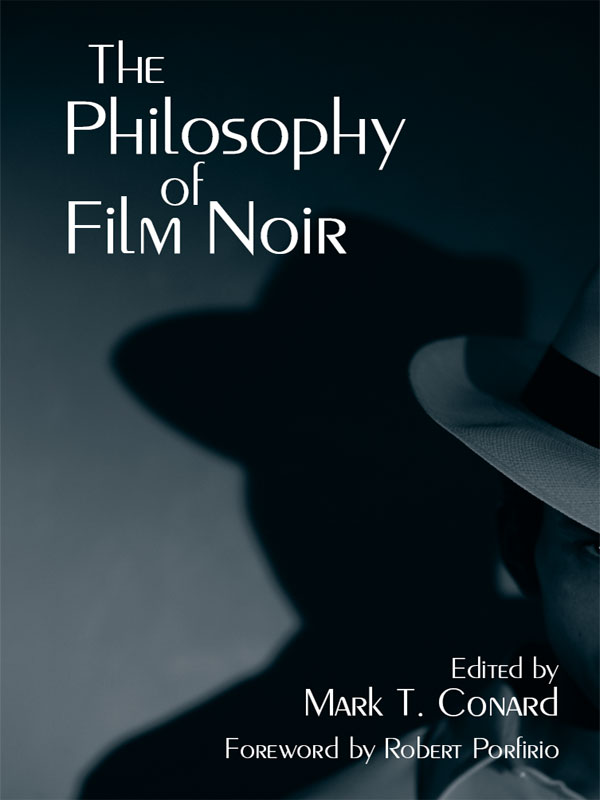THE
PHILOSOPHY
OF
FILM NOIR
EDITED by
MARK T. CONARD
FOREWORD by ROBERT PORFIRIO
THE UNIVERSITY PRESS OF KENTUCKY
Publication of this volume was made possible in part by a grant
from the National Endowment for the Humanities.
Copyright 2006 by The University Press of Kentucky
Scholarly publisher for the Commonwealth,
serving Bellarmine University, Berea College, Centre
College of Kentucky, Eastern Kentucky University,
The Filson Historical Society, Georgetown College,
Kentucky Historical Society, Kentucky State University,
Morehead State University, Murray State University,
Northern Kentucky University, Transylvania University,
University of Kentucky, University of Louisville,
and Western Kentucky University.
All rights reserved.
Editorial and Sales Offices: The University Press of Kentucky
663 South Limestone Street, Lexington, Kentucky 40508-4008
www.kentuckypress.com
10 09 08 07 06 5 4 3 2 1
Library of Congress Cataloging-in-Publication Data
The philosophy of film noir / edited by Mark T. Conard with a foreword
by Robert Porfirio.
p. cm.
Includes bibliographical references and index.
ISBN-13: 978-0-8131-2377-6 (hardcover : alk. paper)
ISBN-10: 0-8131-2377-1 (hardcover : alk. paper)
1. Film noirHistory and criticism. I. Conard, Mark T., 1965
PN1995.9.F54P55 2005
791.436552dc22
2005030639
This book is printed on acid-free recycled paper meeting
the requirements of the American National Standard
for Permanence in Paper for Printed Library Materials.

Manufactured in the United States of America.

Member of the Association of
American University Presses
To Bill Irwin, Pepper Landis, John and Linda Pappas,
Read Schuchardt, and Aeon Skoblemovie lovers all,
and the best friends a guy could have
FOREWORD
In the fall of 1976, when I wrote the article No Way Out: Existential Motifs in the Film Noir for Sight and Sound (vol. 45, no. 4, pp. 21217), little would I have expected that some twenty-five years later a collection of essays under the title The Philosophy of Film Noir would be published. Yet here it is, a welcome indication of how far we have traveled in terms of public awareness and scholarly respectability. Indeed, in 1976, the term film noir was little known beyond a coterie of French and American cineasts and derided by some as a specious classification created in a post hoc manner and not worthy of serious critical attention. By now, the ontology of film noir seems to be settled in its favor, although epistemological argumentation rages on. Anyone interested in tracing the course of this argumentation over the past quarter century would be well advised to consult the appendices in Film Noir: An Encyclopedic Reference to the American Style (ed. Alain Silver and Elizabeth Ward, with Carl Macek and Robert Porfirio, 3rd ed., rev. and expanded [Woodstock, N.Y.: Overlook, 1992]) as well as the Film Noir Readers (Alain Silver and James Ursini, eds., Film Noir Reader [1996; New York: Limelight, 2001], Film Noir Reader 2 [New York: Limelight, 1999], and Film Noir Reader 4 [New York: Limelight, 2004]; and Robert Porfirio, Alain Silver, and James Ursini, eds., Film Noir Reader 3 [New York: Limelight, 2001]), which, taken together, cover virtually all the controversies surrounding the field of film noir scholarship and evidence the debt that such scholarship owes to Alain Silver.
That the essence of film noir is yet to be distilled is implicit in the excellent essays contained in this volume, each of which sees film noir through a slightly different lens. The essays here go well beyond my earlier, somewhat simplistic effort to extract a philosophy of film noir in terms of an outlook on life that these diverse films seemed to sharean attitude toward existence that was akin to modern existentialism, particularly as it evolved in postwar France. Perhaps that is why it was the French cineasts who were the first to identify the cycle. But, if I may be allowed to indulge myself a bit here, I would like to take issue with their assertion (and that of other critics following in their wake, myself included) that what was surprising in these early films noirs was the degree to which they went against the grain of that native-bred optimism that seemed to define the American character (so well articulated by Alexis de Tocqueville in the early nineteenth century). If we take an extensive historical look at this American character, we can detect a dark side implicit in it from its very beginnings, one that predated those vaunted attributes of self-reliance and individual enterprise associated with Yankee ingenuity and those virtues inherent in the Jeffersonian agrarian ideal, the yeoman farmer.
That dark side can surely be seen in the culture and lifestyle of our Puritan ancestry, a heritage quite at odds with the new breed of American exemplified by Benjamin Franklin (at least as he presented himself in his Autobiography, a work that itself went a long way toward papering over those differences). Nathaniel Hawthorne's fiction in turn dramatized this dark side by showing how it worked itself out in the psyche of nineteenth century America. Yet the distinctively American bias given to transcendentalism by Emerson and Thoreauthe faith in the natural world and the emphasis on self-relianceshould have purged America of its darkest inclinations. Walt Whitman, writing before, during, and after the trauma of the American Civil War, is an exemplar in this regard. For, despite the dislocations engendered by that war, he retained his belief in the power of the individual spirit to overcome all odds. Emersonian transcendentalism, however, did not fare as well in the fiction of Melville and Poe. The voyage into nature could end in disaster, as in Melville's Moby Dick, just as the Yankee entrepreneurial spirit could degenerate into the crass materialism of The Confidence Man, a prophetic work given the excesses of America's Gilded Age, and one that questioned the validity of any sort of faith.
The work of Edgar Allan Poe is particularly relevant to anyone tracing the antecedents of American film noir. Short tales such as Ms. Found in a Bottle and The Narrative of Arthur Gordon Pym left the outcome of the transcendental voyage quite problematic. But it was Poe's arabesque tales that called into question the power of human reason. These grotesque stories harked back to an earlier tradition of gothic literature, yet, more often than not, they eschewed the supernatural in favor of such themes as murder, revenge, betrayal, and entrapment, and they were frequently centered around the figure of a fatal woman. And they paved the way for such future practitioners as Cornell Woolrich. As if in an effort to maintain his own sanity, Poe also wrote his stories of ratiocination and, in so doing, created the prototype for the classic private detective, an agent of order both moral and social. In reaction to this classic detective, Dashiell Hammett helped create the modern hard-boiled private eye, whose allegiance was only to a highly personal and private code, whose style was virtually everything, and who attempted to survive in a universe as chaotic as anything in Poe.
At the turn of the century, the pragmatism of William James, with its emphasis on radical empiricism, proved to be the philosophic death knell for Emersonian transcendentalism. And as America moved into the twentieth century, it was beset with a variety of ismsDarwinism, determinism, Freudianism, Marxismall of which challenged the integrity of the individual. Social Darwinism went so far as to provide a rationale for an abusive variety of capitalism that, unchecked, placed the plutocrat at the top of the social ladder. Not that the works of Spencer, Nietzsche, Schopenhauer, or Freud were part of the mass culture of that era. Few beyond the well educated would have even been familiar with them. But their influence on American fiction, especially on those writers who felt a kinship with literary naturalism, was profound. And large numbers of Americans did read authors like Frank Norris, Theodore Dreiser, and Jack London, who, along with others of their ilk, reduced the human being to a monad, little more than Dreiser's waif amidst forces.


